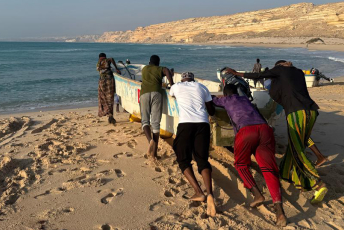Sierra Leone’s Atlantic coastline stretches for 400 km and once contained abundant marine resources crucial to the nation’s economy.
The fishing industry contributes up to 12% of the country’s national GDP, says the Ministry of Fisheries and Marine Resources (MFMR) and employs approximately 500 000 people out of a population of eight million – reflecting its significance in supporting livelihoods and sustaining the economy. Fish is also the primary source of protein for about 80% of Sierra Leone’s population.
But these jobs and economic benefits are in jeopardy. They have already dwindled and are under continual threat by the brazen network of foreign vessels engaged in illegal, unreported and unregulated (IUU) fishing along Sierra Leone’s coast, including exclusion zones designated for local fishers. This transnational organised crime generates billions of dollars annually in profit. Ongoing government efforts to address this challenge have been largely unsuccessful.
The consequences are acute. President Julius Maada Bio suggested in 2020 that IUU fishing cost his country around US$50 million a year, with much of the stolen fish ending up in Asia. In contrast, only US$18 million from the legal fishing industry reached the country’s coffers. The sector is reportedly riddled with corruption and mismanagement.
This situation seems intractable. Illegal fleets, all foreign-owned, have exploited Sierra Leone’s waters for nearly four decades. An MFMR adviser who requested anonymity noted: ‘Many countries steal our fish, including neighbouring West African states.’
High-value fish species like bonga, snapper and grouper are particularly vulnerable. Illegal operators use advanced techniques to evade detection, says Pele Gandy-Williams, Sierra Leone’s Financial Crimes Working Group Chairperson. They fish in restricted zones, falsify catch data, turn off transponders on their vessels and frequently change vessel registration to avoid tracking.
The IUU Fishing Index indicates that Chinese vessels are the worst offenders, but the government is hesitant to act as it has a close relationship with China. Feeling abandoned by the government, local fishing communities have started taking the law into their own hands. Fisherman Abdul Kamara, from the Funkia coastal community near the capital Freetown, told ENACT that member of local communities had begun attacking foreign boats.
Local anger intensified when news broke that China intended to build a fishing harbour and fish meal processing plant at the pristine Black Johnson Beach, a protected rainforest and beach. Yielding to ongoing community resistance, the government has subsequently halted the project, says the MFMR adviser.
The current legal framework for fisheries management is contained in the 2017 Fisheries and Aquaculture Act and complemented by the 2019 Fisheries and Aquaculture Regulations. This framework offers support for fisheries governance and aquaculture, with a focus on IUU fishing.
The act prohibits unauthorised fishing activities, including taking, introducing, trans-shipping or purchasing fish caught illegally. It establishes a vessel monitoring, control and surveillance (MCS) unit responsible for observing, monitoring and managing fishing operations, and enforcing sustainable fishing practices.
Reports on government’s tougher stance on IUU fishing vary and can seem contradictory. The government claims that moderate gains have been made in preventing and disrupting IUU fishing, particularly through tracking vessel monitoring systems located on each ship. However, local fishers report that this is far from sufficient to curb the scope of the current violations.
Violators entering exclusion zones, where limited fishing is allowed, face fines exceeding US$1.5 million. However, here’s the catch: enforcement relies on a single patrol boat to cover Sierra Leone’s vast coastline, and this vessel is often stuck in the harbour due to fuel shortages.
The MFMR is also contending with a significant data gap – it estimates an annual fish harvest of roughly 228 000 tonnes but lacks crucial data on fish population replenishment rates. Without this information, and faced with entrenched IUU fishing and harmful fishing practices, Sierra Leone’s fisheries are increasingly unsustainable.
Sierra Leone urgently needs a comprehensive fisheries strategy. Such a strategy would form the cornerstone of resource management and include monitoring, enforcing regulations, training personnel, promoting sustainable practices and fostering international collaboration to ensure compliance.
Acknowledging the scope of its IUU fishing problem, Sierra Leone has been collaborating with neighbouring countries in regional efforts to address the problem. This includes the West Africa Regional Fisheries Program, which aims to share information, coordinate patrols and develop joint enforcement strategies.
There have been some successes. In 2021, a collaborative effort between the Sierra Leone navy and Sea Shepherd Global, an ocean conservation non-governmental organisation, led to the successful apprehension of five foreign-owned fishing vessels operating without a licence. Two were from China and three were from South Korea.
A key challenge is that IUU fishing occurs alongside the legitimate industry, making it harder to monitor and detect. Disrupting these networks requires consistent action at sea and greater enforcement of existing legislation. As a signatory to the Port State Measures Agreement, Sierra Leone should also prioritise port-based inspections and deny docking rights to vessels known to be involved in IUU fishing.
Tracking both vessels and financial flows across complex shipping and corporate structures needs a high degree of inter-agency and international cooperation. As a start, Sierra Leone must engage diplomatically with nations such as China that frequently breach its territorial waters.
Dr Feyi Ogunade, Regional Organised Crime Observatory Coordinator, West Africa
Image: UN Photo







